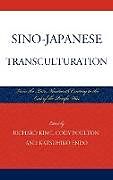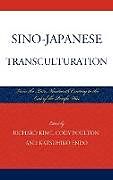Sino-Japanese Transculturation
Einband:
Fester Einband
EAN:
9780739171509
Untertitel:
Late Nineteenth Century to the End of the Pacific War
Autor:
Richard (EDT) King, Cody (EDT) Poulton, Ka Endo
Herausgeber:
Lexington Books
Anzahl Seiten:
318
Erscheinungsdatum:
01.01.2012
ISBN:
073917150X
Informationen zum Autor Richard King is professor of Chinese at the University of Victoria, specializing in modern and contemporary Chinese fiction and popular culture. He is the editor of Art in Turmoil: the Chinese Cultural Revolution 1966-76 (2010) and co-editor of Global Goes Local: Popular Culture in Asia (2002), the translator of Liu Sola's novel Chaos and All That (1994), and Zhu Lin's Snake's Pillow and Other Stories (1998), editor and co-translator of Heroes of Chinäs Great Leap Forward (2010), and the editor and co-translator of Living with Their Past: Post-Urban Youth Fiction by Zhang Kangkang (2003).Katsuhiko Endo is assistant professor of modern Japanese history at the University of Victoria, Canada. He is editor and translator of Rekishi to Kioku no Koso [The Struggle Between History and Memory] (2010), Harry Harootunian s collection of essays on postwar Japan, and wrote the forward for that work. He is currently working on his book, titled Empire State of Mind, Volume I: Fukushima, Japanese Baseball, and World History.Cody Poulton is professor of Japanese literature and theatre at the University of Victoria, Canada. His recent publications include Spirits of Another Sort: The Plays of Izumi Kyoka (2001), twenty entries on modern Japanese theatre for The Oxford Encyclopedia of Theatre and Performance (2003) and A Beggar's Art: Scripting Modernity in Japanese Drama, 1900-1930 (2010). He has also been active as a translator of kabuki and modern Japanese drama, for both publication and live stage productions in Canada, the United States, the United Kingdom, Ireland, Australia and Japan. He is currently working (with Mitsuya Mori and J. Thomas Rimer) on The Columbia Anthology of Modern Japanese Drama.About the contributors: Michael K. Bourdaghs is associate professor in East Asian Languages and Civilizations at the University of Chicago. He is the author of The Dawn That Never Comes: Shimazaki Toson and Japanese Nationalism (2003) and Sayonara Amerika, Sayonara Nippon: A Geopolitical Prehistory of J-pop (2011), as well as the editor of The Linguistic Turn in Contemporary Japanese Literary Studies: Politics, Language, Textuality (2010) and of the English translation of Kamei Hideo's Transformations of Sensibility: The Phenomenology of Meiji Literature (2002).Leo Ching is Chair and associate professor in the Department of Asian and Middle Eastern Studies at Duke University. He is the author of Becoming Japanese : Colonial Taiwan and the Politics of Identity Formation (University of California Press, 2001; Chinese and Japanese translations are available from Maitian chuban and Blues Interactions). His writings have appeared in Public Culture, boundary 2, positions: an East Asian cultural critique, and several other edited volumes. He is currently completing a book manuscript on anti-Japanism in postwar postcolonial Asia and popular culture.Annika A. Culver serves as assistant professor of Asian History and Asian Studies Coordinator at the University of North Carolina at Pembroke. She has also taught at the University of Chicago, Skidmore College, and Beijing University, with research interests in Japanese cultural imperialism, and Sino-Japanese cultural history. Her forthcoming book, Japanese `Avant-Garde Propaganda in Manchukuo: Modernist Reflections of the New State, 1932-1945 (University of British Columbia Press), investigates how formerly left-oriented Japanese writers, artists, and photographers mobilized their talents to produce multivalent works depicting Japanese development and labor in occupied northeast China after a tour or sojourn. Culver has published articles and reviews in History Compass, US-Japan Women s Journal, Stanford Journal of East Asian Affairs (SJEAA), Journal of North Carolina Historians, and Perspectives. Culver s next project, Consuming the West: Sino-Japanese Consumption of Wine, Cigarettes, and Soap from the 1880s-1938, examines from a cultural history standpoint this...
Klappentext
This is a multi-author work which examines the cultural dimensions of the relations between East Asia's two great powers, China and Japan, in a period of change and turmoil, from the late nineteenth century to the end of the Second World War. This period saw Japanese invasion of China, the occupation of China's North-east (Manchuria) and Taiwan, and war between the two nations from 1937-1945; the scars of that war are still evident in relations between the two countries today. In their quest for modernity, the rulers and leading thinkers of China and Japan defined themselves in contradisctinction to the other, influenced both by traditional bonds of classical culture and by the influx of new Western ideas that flowed through Japan to China. The experiences of intellectual and cultural awakening in the two countries were inextricably linked, as our studies of poetry, fiction, philosophy, theatre, and popular culture demonstrate. The chapters explore this process of "transculturation" - the sharing and exchange of ideas and artistic expression - not only in Japan and China, but in the larger region which Joshua Fogel has called the "Sinosphere," an area including Korea and parts of Southeast Asia with a shared heritage of Confucian statecraft and values underpinned by the classical Chinese language. The authors of the chapters, who include established senior academics and younger scholars, and employ a range of disciplines and methodologies, were selected by the editors for their expertise in particular aspects of this rich and complex cultural relationship. As for the editors: Richard King and Cody Poulton are scholars and translators of Chinese literature and Japanese theatre respectively, each taking a historical and comparative perspective to the study of their subject; Katsuhiko Endo is an intellectual historian dealing with both Japan and China.
Inhalt
Preface Introduction, Richard King and Cody Poulton Section I: A Shared Heritage Chapter 1: Richard John Lynn, Straddling the Tradition-Modernity Divide: Huang Zunxian (1848-1905) and His Poems on Miscellaneous Subjects from Japan Chapter 2: Atsuko Sakaki, Waves from Opposing Shores: Exchanges in a Classical Language in the Age of Nationalism Chapter 3: Faye Yuan Kleeman, Pan-Asian Romantic Nationalism: Revolutionary, Literati, and Popular Oral Tradition and the Case Of Miyazaki Toten Section II: Confrontations with the Modern Chapter 4: Viren Murthy, On the Emergence of New Concepts in Late Qing China and Meiji Japan: The Case of Religion Chapter 5: Karen L. Thornber, Collaborating, Acquiescing, Resisting: Early Twentieth Century Chinese Transculturation of Japanese Literature Chapter 6: Siyuan Liu, Lu Jingruo and the Earliest Transportation of Western-Style Theatre from Japan to China Section III: The Culture of Occupation Chapter 7: Yiman Wang, Affective Politics and the Legend of Yamaguchi Yoshiko/ Li Xianglan Chapter 8: Michael Bourdaghs, Japan's Orient in Song and Dance Chapter 9: Annika A. Culver, Manchukuo and the Creation of a New Multi-Ethnic Literature: Kawabata Ysunari's Promotion of "Manchurian" Culture Section IV: Coming to Terms with History Chapter 10: Leo Ching, Colonial Nostalgia or Postcolonial Anxiety: The Dosan Generation In-Between "Restoration" and "Defeat" Chapter 11: Cody Poulton, The Road Taken, Then Retraced: Morimoto Kaoru's A Woman's Life and Japan in China Chapter 12: Elizabeth Wichmann-Walczak, Re-acting an Actor's Reaction to the Occupation: the Beijing Jingju Company's Mei Lanfang Chapter 13: Richard King, "But Perhaps I Did Not Understand Enough": Kazuo Ishiguro and Dreams of Republican Shanghai

Leider konnten wir für diesen Artikel keine Preise ermitteln ...
billigbuch.ch sucht jetzt für Sie die besten Angebote ...
Die aktuellen Verkaufspreise von 6 Onlineshops werden in Realtime abgefragt.
Sie können das gewünschte Produkt anschliessend direkt beim Anbieter Ihrer Wahl bestellen.
Loading...
Die aktuellen Verkaufspreise von 6 Onlineshops werden in Realtime abgefragt.
Sie können das gewünschte Produkt anschliessend direkt beim Anbieter Ihrer Wahl bestellen.
| # | Onlineshop | Preis CHF | Versand CHF | Total CHF | ||
|---|---|---|---|---|---|---|
| 1 | Seller | 0.00 | 0.00 | 0.00 |
